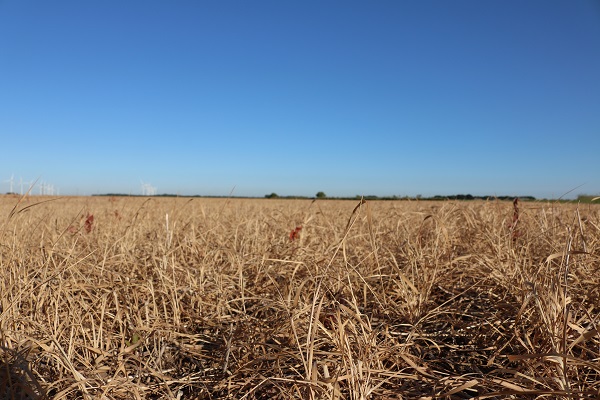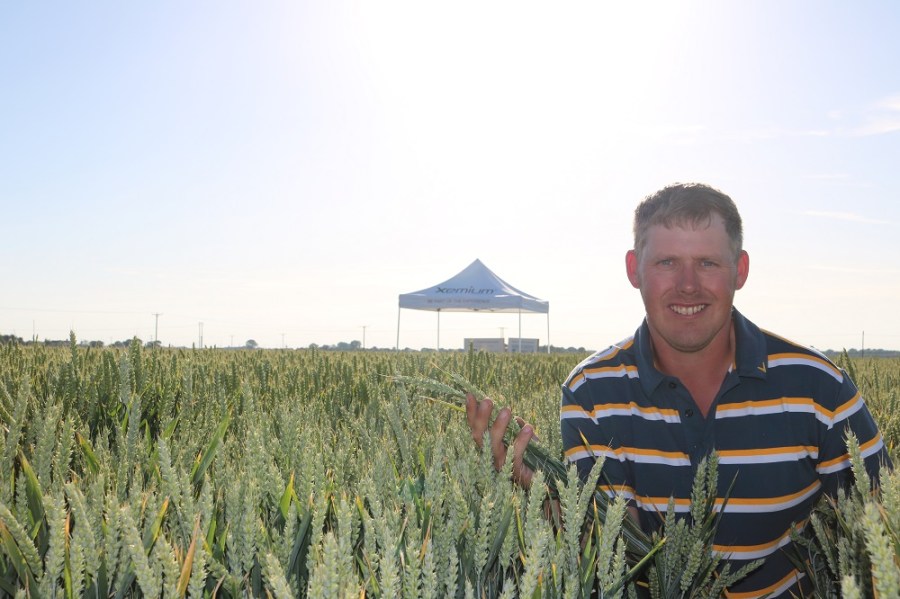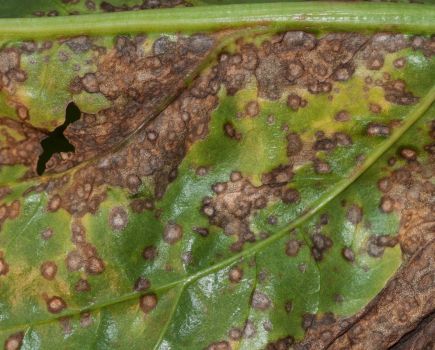While crops trials have been a core feature for Yorks farming family the Hinchliffes, it’s the discussion around them where the true value lies. CPM dropped in on the trials’ open day.
We’re living in a post-truth era. People don’t trust experts any longer, knowledge is so accessible, and communication of ideas is so quick.
By Tom Allen-Stevens
Turning up for the open day at the end of June on the Hinchliffes’ farm at Rawcliffe Bridge, near Goole, E Yorks, you pass a large area of crop that’s clearly been sprayed off with glyphosate.
That in itself is no surprise, especially considering the family’s well documented zero-tolerance approach to blackgrass. But Richard Hinchliffe’s explanation for what happened to the 40ha of spring wheat does slightly knock you sideways. “We drilled it knowing we were going to spray it off,” he says.

The spring wheat crop was drilled in the knowledge it was going to be sprayed off.
“The primary driver was blackgrass – everything we do is geared around integrated weed management (IWM). But we did the numbers and at best that field was only ever going to make a small profit, so it was best in the long term to establish the crop but then spray it off. We’ll establish a cover crop over the winter then put the field into linseed and beans next spring.”
The family farms 560ha, based at Rawcliffe Bridge, which includes Dikes Marsh Farm nearby. While much of the land at Rawcliffe Bridge lies on a rich layer of alluvial silt over clay, ground at Dikes Marsh is a tougher high magnesium clay. There have been trials of one sort or another on the farm for as long as Richard can remember, while it was the first farm in BASF’s Europe-wide Farm Network, developing sustainable farming practices, that are then promoted to other farmers and policy makers.
It’s no surprise then that there’s also a Real Results trial on the farm, but for Richard the results themselves are only a part of what on-farm trials involve.
“We’re living in a post-truth era,” he says. “People don’t trust experts any longer, knowledge is so accessible, and communication of ideas is so quick. More photos are taken and shared on social media in one year now than were taken in the entire history of time up to the point these platforms existed. It’s a totally different world where you can join the conversation shared by thousands of different farmers with your smart phone and benefit from their experiences.”
And the dead spring wheat is part of that conversation, not just for the local farming community that’s turned up for the open day. “When I sprayed the crop off, I shared the photos on Twitter. I received a really positive reaction and I think it helped people who were facing a similar tough decision. What I’ve learnt is that the subtle approach doesn’t work. You have to get a grip and do something about it.”
He set out to explore sustainable resistance management through a Nuffield scholarship, sponsored by the Yorkshire Agricultural Society, and completed his report last year. His main findings were:
- Herbicide resistance is a global issue
- Genetically modified crops are not a solution
- Glyphosate resistance is a massive threat
- IWM is the only sustainable way farmers will stay in control of the problem
- Industry needs to unite behind one initiative for dealing with herbicide resistance
- Peer-to-peer learning and knowledge exchange is absolutely pivotal in building an effective IWM approach
- Herbicide labels should clearly state mode of action and training should be provided to understand what it means.
“On this last point, it looks as though the industry is now adopting this measure. Education on MoA is also key, however, especially in this post-truth era,” says Richard.
He’s beginning to see results from his own blackgrass battle, though. “When we took on Dikes Marsh Farm 18 years ago, we hired in a combine because it was so full of blackgrass we wanted to keep it contained. Now, we don’t spray any post-emergence blackgrass herbicides and rely on pre-em herbicides followed by rogueing as the main control methods.”
Sustainable resistance management is only a means to an end, however. “You have to decide what your end game is in farming. For me I don’t want to spend my whole career battling blackgrass – there’s so much more to explore.”
Which is where the wealth of on-farm trials come in. “I remember in the mid 1990s we were one of the first farms to have epoxiconazole. They were exciting times and we’ve seen the progress of fungicides since, through kresoxim-methyl, boscalid, F500, then Xemium and now Revysol.”
They provide some local data and insight into the technology, and Richard feels he’s already gleaning the benefits – farm yields are lifting off the yield plateau. But it’s the conversation around the technology where he believes the real opportunities lie. “Firstly, we must get a grip on responsible stewardship – it’s been important for herbicides, but it’s doubly so for fungicides and it’s a collective responsibility. Resistant septoria isolates are not confined to the farms that generate them.”
As with herbicides, he feels solutions come from farmers sharing experience. But the opportunity for rewards for those who take part are far greater, he believes. “From what I’ve seen of Revysol, it can reset the clock on septoria. If we master an integrated approach to disease, imagine what other properties we can explore and to what heights we can take crop management – I think there are some exciting times ahead.”
Dikes Marsh Farm Real Results trial, 2017
Trials show way on crop chemistry
The open day at Rawcliffe Bridge was a chance for around 100 local growers who turned up to see trials undertaken, including a guided tour of the 32 wheat variety plots. “This year, the whole site was direct drilled, which adds extra interest,” notes Richard Hinchliffe.
It was also a chance to see plots that had been treated with Revysol, the new triazole from BASF currently going through registration. This had been included in a number of programmes applied across KWS Santiago.
Some of the plots partnered Revysol with BASF’s Xemium SDHI chemistry, and local agronomy manager Dave Belshaw notes that good fungicide stewardship remains and will continue to be a top priority.
“Tests have shown Revysol exhibits effective control of septoria isolates found to be partially resistant to other triazoles. It’s understood this is down to a unique isopropanol moiety which allows it to form a hook, so it binds better to the target site,” he explains.
“Effective control of septoria relies on every grower managing disease effectively and using a programme of fungicides involving a number of different modes of action. We need every tool in the fungicide toolbox to be working at its best.”
Pending regulatory approval, commercial roll-out of Revysol is expected in 2020.
The benefits of an early PGR programme were also evident from the trials. A split dose at T0 and T1 of Canopy (mepiquat chloride) or Medax Max (trinexapac ethyl) are the favoured approaches Dave picks out from the trial.
“What’s noticeable is that in this treatment the flag leaf currently sticks out above the ear, while in the untreated plot, the flag’s more shaded by the ear – this may have an effect on sunlight interception,” he suggests.
Registration moves for new blackgrass herbicide
BASF has started the global registration initiatives for its new blackgrass herbicide. The company has submitted the regulatory dossier for Luximo in the European Union (EU), with first sales expected in the UK in 2021.
The new compound has demonstrated excellent performance against grassweeds, says BASF, making the initiative an important milestone in expanding its global herbicide portfolio.
“BASF has a long history for more than seven decades of successful herbicide research and development,” says Markus Heldt, president of the BASF Crop Protection division.
“Luximo is one of the latest solutions, and an outstanding example. The constant and close exchange with our customers has helped us find the right, effective solutions answering growers’ challenges: support for resistance management, environmentally friendly approaches and fast-acting solutions.”
Luximo will be positioned at the heart of grassweed management programmes. BASF says the active ingredient provides pre-emergence, residual control against a broad range of grasses, including difficult-to-control blackgrass and ryegrass in winter cereals. The molecule boasts a novel mode of action that controls grasses that have developed resistance.
Pending regulatory approval, BASF expects first market introductions of Luximo-based product formulations in 2021 in the UK, with a release in Australia expected a year earlier.
BASF’s Ruth Stanley notes there’s no known cross-resistance with Luximo. “So it’ll strengthen existing integrated weed management systems and aid sustainable resistance management. But it makes it all the more important to have an effective blackgrass control strategy in place.”
To that end, she’s been encouraged by the positive steps taken by growers who have climbed on board BASF’s Blackgrass Battle bus on its recent tour of open days and events. Around 30-200 people have taken part at each stop, signing up to be Blackgrass Beaters and offering their own tips for effective control. “We’ve now picked up around 200 of these – I’ve learned things I’d never have considered,” says Ruth.
The plan is to bring these together in 2019 at a conference to which Blackgrass Beaters will be invited. “The whole initiative is about sharing the knowledge. What we’ve found on this tour is that attitudes have really changed and there’s now a much more holistic approach to tackling blackgrass. The solutions lie with those farmers who are making progress, and the more these ideas are shared and practised, the less pressure herbicide chemistry will face.” https://basfrealresults.co.uk/awc/
The Real Results Circle
BASF is partnering with ADAS and AgSpace for the second year of the Real Results Circle. The initiative is focused on working with 50 farmers to conduct field-scale trials on their own farms using their own kit and management systems. The trials are all assessed using ADAS’ Agronōmics tool, which, for the first time, brings statistical certainty to tramline, or field-wide treatment comparisons.
In this series, partnered with CPM, we will follow the journey, thinking and results from farmers involved in the programme. The features will also look at some in-depth related topics, such as SDHI performance and data capture and use.
We want farmers to share their knowledge and conduct on-farm trials. By coming together to face challenges as one, we can find out what really works and shape the future of UK agriculture.
To keep in touch with the progress of these growers and the trials, go to www.basfrealresults.co.uk





